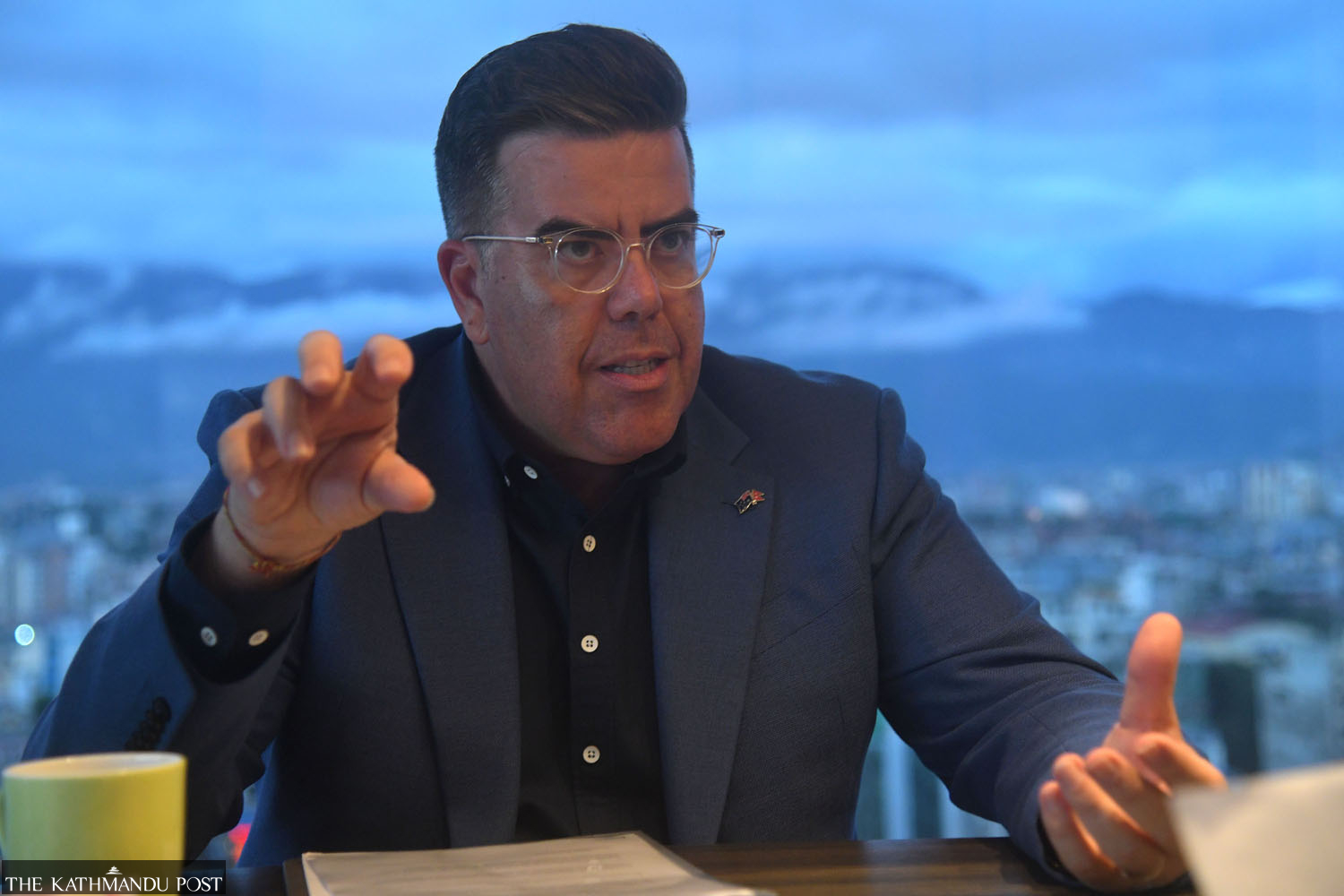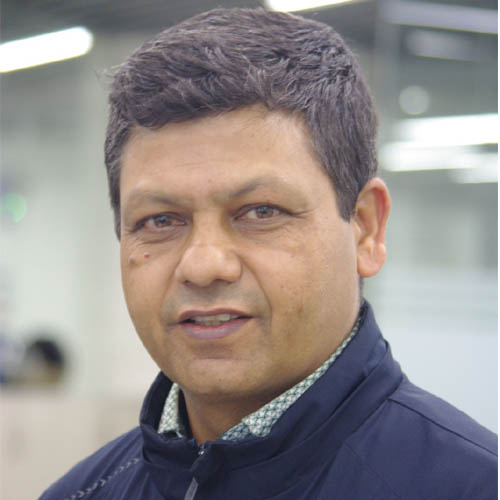Interviews
I am impressed by how Nepal’s federal system is evolving
Milton Dick, Speaker of the Australian House of Representatives, on various facets of Nepal-Australia relations.
Thira Lal Bhusal
An Australian parliamentary delegation led by Milton Dick, Speaker of the Australian House of Representatives, visited Nepal from October 3 to 7. This was the first-ever Australian parliamentary delegation-level visit to Nepal in over six decades of diplomatic ties between the two countries. While here, the Australian Speaker met his Nepali counterpart Dev Raj Ghimire and National Assembly chair Ganesh Timilsina, among other leaders and officials. Thira Lal Bhusal of the Post sat with him to discuss various facets of Nepal-Australia relations.
You are the leader of the first Australian parliamentary delegation to Nepal. How fruitful has the historic visit been?
It was a deliberate decision by our parliament to ensure that Nepal received one of my early visits as the Speaker of the House of Representatives. I was elected just over a year ago. Because of Nepal’s significance in the geopolitical region, it was a natural choice for me. It was a childhood dream of mine to visit Nepal as well.
Why do you think it took six decades for this breakthrough visit between two old parliamentary democracies?
We have 63 years of strong bilateral friendship. That’s why Australia has seen Nepal as a friend. And, good friends should always come together. Nepali community is a growing diaspora in Australia. The number of Nepali-Australians is around 130,000, including over 60,000 Nepalis studying in Australia. A parliamentary visit was long overdue.
Nepal-Australia parliamentary friendship forums have already been formed and are active in both the countries. How helpful have they been to strengthen relations?
Parliamentary friendship groups in our parliament play a critical role in fostering and improving relationships. The Australia-Nepal parliamentary friendship group is one of the largest, with 68 members and senators. I am so pleased to catch up with my friends, the honourable Speaker and the chairperson of the National Assembly here in Nepal, and to learn that a friendship group has been formed here in Nepal’s parliament as well. It is terrific news for bilateral ties and for our people to people links. They are a great bridge between the peoples of Australia and Nepal.
You met key politicians and officials here in Kathmandu. What were the major talking points?
In our high level discussions, we covered a range of issues particularly the role of friendship groups, as to how they would strengthen our parliamentary links. We discussed a number of trade issues, students and education issues, tourism, and more tourists coming to the Himalayas. So the talks were diverse and extensive.
Was there any specific concern from Nepali leaders?
The concerns centred on ensuring that there are good trade opportunities between the two countries, that we properly train Nepali students in Australia and then of course helping the Nepali economy. I think the talks had a focus on how our parliaments can work together. We also discussed strengthening people to people links and improving trade opportunities. And more importantly, when Nepali students return, they can use the practical knowledge to help Nepal grow its economy.
Nepal and Australia have both been practising parliamentary and federal systems. How can the two countries benefit by exchanging their experiences?
Well, I am very impressed with the expansion and the rollout of the provincial governments here and how the federal system is evolving. Australia has a long and trusted federal system with local, state and federal governments. I believe we can learn from each other. Nepal is going through changes and has unique opportunities. Australia is keen to assist where appropriate and where there is opportunity to help the Nepali government and its people benefit from what Australia has gone through over 100 years of federalism.

What does it take to sustain the federal system? What does Australia’s experience suggest?
I would talk based on Australian experience. A strong system of good representation, free and fair elections, transparent funding between the different levels of government. Making sure that there are clear lines of financial transition and supports and grants. All those things are important but also the fact that you take people along on the federal journey. That is the Australian experience.
Nepali community and particularly Nepali students are one of the fastest growing cohorts in Australia. Still, Australia doesn't do visa processing in Nepal and Nepalis have to visit New Delhi for the same. Is there a possibility of establishing a visa processing facility in Kathmandu anytime soon?
Well, I understand this issue. However, there is no plan to change our visa processing. Our current system is quite efficient.
Despite decades-old bilateral relations, Nepal and Australia haven’t been able to expand bilateral trade and investment. After talking to senior Nepali politicians and other officials do you now see any prospect of expanding Nepal-Australia trade and cooperation?
Those negotiations will take place between our trade ministers. But from business community leaders I met, I see enormous potential and opportunities between two countries that are bound by democracy, people to people ties and cultural relations. I have been heartened by the candid spirit of the Nepalis people and I think opportunities through trade, investment and small business groups both here and in Australia are unlimited. I am excited to take the message back to our parliament that Nepal is open to business, and so is Australia.
What about prospects in tourism? Despite completing almost all procedures, Nepal Airlines has not gotten a slot to fly to any of the Australian airports. Any development on that front?
Those negotiations and processes will be ongoing. I met with a number of tourist operators and tourist leaders in Nepal. I think our economies have opened up, people can travel as the pandemic is over. We are seeing a lot of tourists coming to Nepal. I have been really impressed with the growth of eco-tourism here in Nepal.
As you visited Nepal and met leaders and key officials here, did you notice any unidentified or unexplored area where the two countries can work together in the future?
I think we have a lot of room for cooperation on innovation and manufacturing areas. I know there is a growing manufacturing space here. I have been impressed by the new hotels built across Kathmandu. The growing tourism sector is targeted at all kinds of tourists: high-end, middle-income and budget tourists. I think there is an enormous opportunity for Australians to invest in Nepal and also the other way round. Our relationship is two-way.
Do you have any specific message to Nepali communities including the students?
Australia is a great friend of Nepal. We welcome Nepali students to Australia with open arms. Nepali students coming to Australia are well looked after, respected. There is a growing Nepali-Australian community in my constituency. They are hard working. They are great neighbours. We encourage students to experience our world-class education and training and skills-development systems and to bring back experience and expertise in Nepal.




 18.12°C Kathmandu
18.12°C Kathmandu




.jpg&w=200&height=120)







